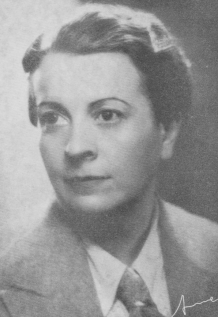
The plaques will celebrate figures including children’s writer Elena Fortun.
Pioneering Spanish women remembered through new plaques in Madrid
Pioneering women who made a major contribution to journalism, literature, drama, law and politics in pre-civil war Spain are being remembered for the first time through new public memorials in Madrid thanks to a University of Exeter academic.
The work of Nuria Capdevila-Arguelles means the role of 15 women will be recognised in the Spanish capital through plaques which will be put up where they lived or worked. The plaques will be seen at different addresses in Madrid like Calle Huertas or Palacio de la Prensa.
It is the first time the role of these women has been publically acknowledged. Madrid City Council is able to put up the memorials thanks to research by Professor Capdevila-Arguelles, who wants to ensure future generations of Spaniards understand the contribution of Spain’s first generation of feminists active before 1936.
The plaques will celebrate figures including children’s writer Elena Fortun, journalist, writer, actress and diplomat Isabel Oyarzábal (1878-1974), journalist, writer, translator and women's rights activist Carmen de Burgos, (1867-1932), Spanish literary critic, researcher, educator and advocate for women's rights María Goyri (1873-1955), feminist writer, dramatist, translator and politician María de la O Lejárraga, (1874-1974), lawyer and republican politician Victoria Kent, 1898-1987), poet and dramatist Concha Méndez, (1898-1986), poet Ernestina de Champourcín, (1905-1999) and poet, narrative writer and teacher Carmen Conde (1907-1996). Many of them appear in the much acclaimed documentary series Las sinsombrero, directed by Tania Ballo and with Professor Capdevila-Argüelles as academic advisor.
The Spanish Civil War and the ensuing 40 years of Francoism meant the end of the short-lived transformation of civil liberties in the Spanish Second Republic. Franco´s dictatorship reinforced a very traditional interpretation of the role of women in society - one of family care and motherhood. Even after his death in 1975 progressive laws of the 1930s were rarely spoken about or acknowledged by the public. Spain had entered into a pact of oblivion that silenced women´s history. Until now. The talents and achievements of women went unnoticed, while the work of male poets, artists and writers was widely known and celebrated.
Professor Capdevila-Arguelles wants to remind the public of the legacy of these women, not just through their literary and artistic outputs but also through the study of their personal lives. She has gained access to their private archives and has used this information to write the text on the plaques.
Professor Capdevila-Arguelles said: “The fact that the work of these women is not known means there is a lack of female role models in Spain. It is so important that the younger generation knows about their work and learns from their example, and from Spain’s experience of moving along a path to equality before.
“Their experience represents the struggle of Spain to reach modernity and contemporary society can learn a lot from their work and their feminist views.”
This ongoing research has also influenced Spanish politicians to vote in 2015 to change educational programmes in order to include women’s contribution to arts and sciences in 20th-century Spain.
Date: 16 February 2017
